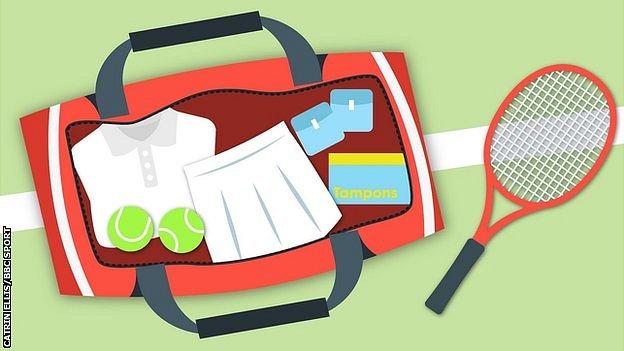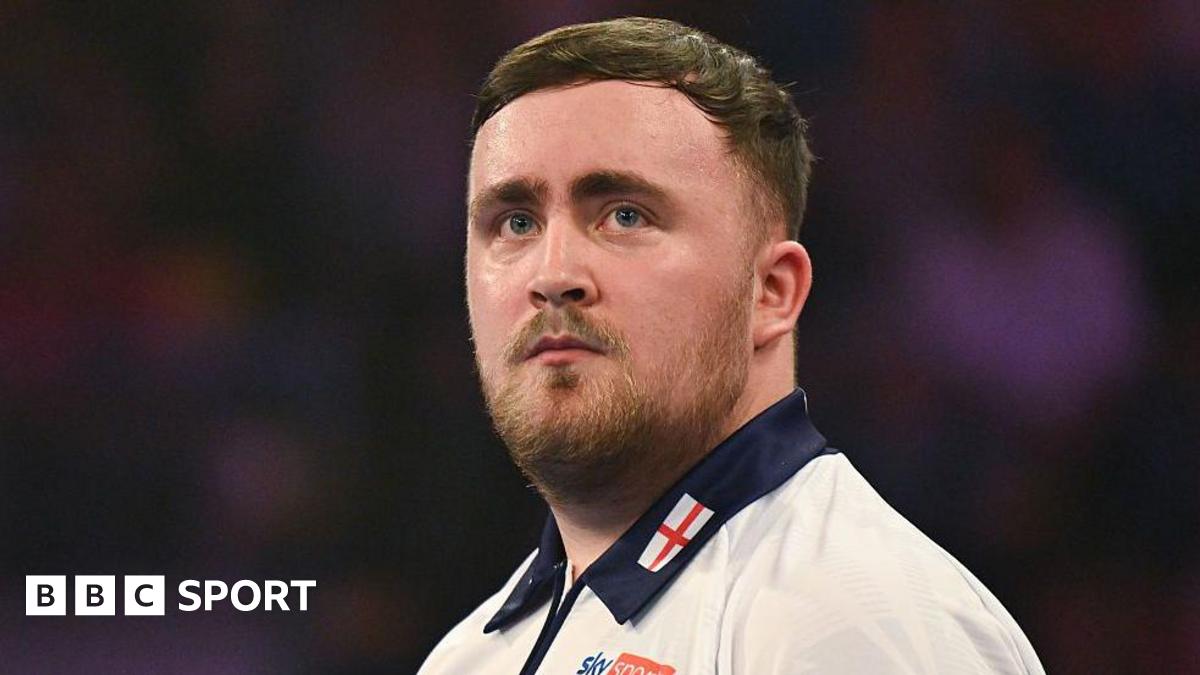ARTICLE AD BOX
 Tennis whites have become synonymous with Wimbledon
Tennis whites have become synonymous with Wimbledon| Venue: All England Club Dates: 27 June-10 July |
| Coverage: Live across BBC TV, radio and online with extensive coverage on BBC iPlayer, Red Button, Connected TVs and mobile app |
When former Olympic tennis champion Monica Puig wrote about the "mental stress" of wearing white at Wimbledon while on your period, the replies were illuminating.
A lot of respondents knew what Puig was talking about - that uncomfortable feeling of "oh, have I leaked?" along with the aches, pains and fatigue that can come with a period.
The majority who replied were supportive, not just of Puig speaking out but of having a wider discussion around the dress code and periods. One or two admitted they had not thought about it being an issue until the Puerto Rican pointed it out last month.
"It is absolutely something the players talk about around Wimbledon because of the all-whites," Britain's Heather Watson tells BBC Sport.
"I think people speak about it a lot - maybe not to the media but among ourselves, for sure."
Things are changing. Conversations around periods and sport are growing. So, let's talk about Wimbledon whites and menstrual bleeding.

Wimbledon whites are an iconic tradition.
White was initially the chosen colour for tennis kits because it avoided sweat patches appearing as it would on coloured clothing. The rules around the whites at Wimbledon are strict. Shorts, skirts and tracksuit bottoms must be completely white, except for a single trim of colour "no wider than one centimetre" down the outside seam.
For Watson, playing in whites is a special experience. "I really like the tradition of it and I wouldn't want to change that," she says. "My only stress is that I get my period but I just plan my period around it."
Watson says she would be concerned, aesthetically, about bleeding through her whites. But her biggest problem is that taking the pill does not stop the symptoms that affect her game. "I get bloated, I get cramps and fatigue," she explains.
The Briton was one of the first tennis players to speak about the impact her period had on her performance when she was beaten in the first round of the Australian Open back in 2015.
Arriving in Melbourne after winning the title in Hobart a week before, Watson says she was "feeling great within my tennis". But on the day of the match, her period started. Watson has "one awful day" every period where she has little energy or strength. Seven years ago, that day left her feeling light-headed and lethargic as she lost 6-4 6-0 to Tsvetana Pironkova.
So when that day falls in the middle of Wimbledon, Watson's home Grand Slam and the place where she won the mixed doubles title in 2016, she takes action.
"I literally had this conversation with Daria [Saville, Australian player] a few weeks ago when we went to practise at Wimbledon together," Watson explains.
"I'd started my period that day and you have to wear all whites at Wimbledon throughout the year as well. I thought 'oh, that's annoying.'
"Then I worked out that I'll probably be on my period again during the Championships so I said I'll probably go on the pill just to skip my period for Wimbledon. That's the thought process and conversations that girls have about it."
While periods and their potential impact on sport are being discussed more, the potential discomfort about wearing white has largely been kept to chats between the players.
Not every player will want to take a pill. Just as performances can be affected by periods, so too can some women feel that a pill affects them on the field. The BBC's Women's Sport Survey from 2020 found that 60% of respondents felt their performance was affected by their period, while 40% did not feel comfortable discussing their period with coaches.
Other players have spoken about the impact of periods. Zheng Qinwen, the only player to take a set off the unstoppable Iga Swiatek at this year's French Open, was hampered by stomach cramps in the final two sets. She said afterwards it was down to "girl things," adding: "I have to do sport and I always have so much pain on the first day. I couldn't go against my nature."
Petra Kvitova spoke about periods before beginning her Wimbledon title defence in 2015, although she did not have an issue with wearing white. "It's never really easy to deal with one more tough thing," she said. "If we have to play the match or training or something, it's difficult."
Wimbledon has a player relations team and player medical team which work closely with the athletes to discuss and address a range of issues, including periods.
"We want to ensure we are prioritising women's health and providing players with anything they require depending on their individual needs," a Wimbledon spokesperson said.
"It could be about how somebody is feeling, it could be needing to talk to someone - all sorts of different things that that team provide.
"The health and wellbeing of players competing at Wimbledon is of the utmost importance to us - we want everyone to feel comfortable and we put that at the centre of everything we do."
Players could fear that advocating for change for women or speaking about periods means people will assume it is being used as an excuse for a poor performance.
Take toilet breaks, as an example. Stefanos Tsitsipas' meandering bathroom breaks during the 2021 US Open led to debates about them being used as a tactical timeout. Some wanted bathroom breaks across Grand Slams to be limited further, for both men and women.
But say a woman wants to use the bathroom break to change a tampon or pad. She has one chance to do so during a best-of-three match, taking three minutes purely for a toilet break or five if she also wants to change her clothing. The Grand Slam rulebook states going over this time means the player will be penalised with back-to-back time violations.
In that time, she needs to get to the toilet, change the pad or tampon, dispose of the old one, make sure she feels comfortable and won't leak, potentially change clothes then pull up the whites and go back out. In practice, the timing of the length of the break will be at the umpire's discretion.
A further bathroom break can be authorised but that is likely to mean speaking to an umpire with a microphone or camera nearby - something that some players may not feel comfortable doing.
Some clothing companies are period-proofing their clothing and Adidas told BBC Sport it had incorporated such technology across women's training products. Wimbledon also keeps abreast of clothing innovations, allowing it to support the players better while maintaining the white clothing it says is a "fundamental" part of its traditions.
"In 2019 we changed the clothing policy so that players could wear approved leggings and mid-thigh compression shorts, which was part also of a broader change to the WTA dress code," a Wimbledon spokesperson said.
"If somebody wanted to wear something underneath their whites then they are more than entitled to do so."
As well as making players feel comfortable it could also help stop younger girls dropping out of sport. An Adidas survey from 2021 reported one in four girls dropped out of sport in adolescence, with fear of period leakage a key reason.
"If [a period] is a reason for someone not to take up sport, then hearing people speak about it would probably convince them otherwise," Watson says.
"I actually think it should be much more normal to speak about those things. There are certain things in life that people don't speak about, and I'm not sure why, because it's part of 'mother nature,' isn't it? Everybody deals with it differently."
Wimbledon is not the only sport where women wear white - Test cricketers have also spoken about the anxiety around bleeding in their whites while playing. While it is a tradition, one that is part of the furniture of the summer of sport, it was one that was established in the 19th Century, when periods were not widely talked about.
Former world number one and 18-time Grand Slam champion Chris Evert recently said she wished she had talked about the impact her period had during her career.
But times are changing, and those conversations are happening now.

- America's most powerful man in history: How did J Edgar Hoover know too much for any US president to fire him?
- Test Match Special: Jonathan Agnew asks Moeen Ali all of your questions in the commentary box


 2 years ago
77
2 years ago
77








 English (US) ·
English (US) ·